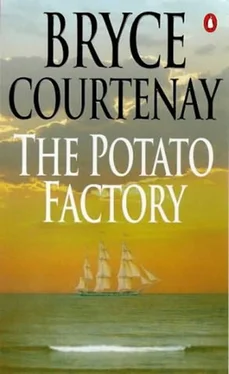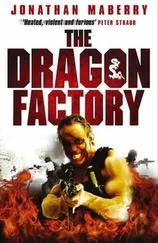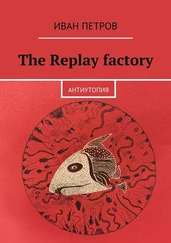Bryce Courtenay - The Potato Factory
Здесь есть возможность читать онлайн «Bryce Courtenay - The Potato Factory» весь текст электронной книги совершенно бесплатно (целиком полную версию без сокращений). В некоторых случаях можно слушать аудио, скачать через торрент в формате fb2 и присутствует краткое содержание. Жанр: Современная проза, на английском языке. Описание произведения, (предисловие) а так же отзывы посетителей доступны на портале библиотеки ЛибКат.
- Название:The Potato Factory
- Автор:
- Жанр:
- Год:неизвестен
- ISBN:нет данных
- Рейтинг книги:3 / 5. Голосов: 1
-
Избранное:Добавить в избранное
- Отзывы:
-
Ваша оценка:
- 60
- 1
- 2
- 3
- 4
- 5
The Potato Factory: краткое содержание, описание и аннотация
Предлагаем к чтению аннотацию, описание, краткое содержание или предисловие (зависит от того, что написал сам автор книги «The Potato Factory»). Если вы не нашли необходимую информацию о книге — напишите в комментариях, мы постараемся отыскать её.
The Potato Factory — читать онлайн бесплатно полную книгу (весь текст) целиком
Ниже представлен текст книги, разбитый по страницам. Система сохранения места последней прочитанной страницы, позволяет с удобством читать онлайн бесплатно книгу «The Potato Factory», без необходимости каждый раз заново искать на чём Вы остановились. Поставьте закладку, и сможете в любой момент перейти на страницу, на которой закончили чтение.
Интервал:
Закладка:
The jury took less than an hour to dismiss the charges of forgery against Ikey and the judge pronounced him not guilty for lack of evidence. Ikey's coat of many pockets had saved his life.
Only two more charges remained, those involving the purchase of goods known to have been stolen, and both were capital offences. Alas, with these Ikey's luck finally ran out and he was found guilty on both charges. The hangman had secured his man at last. But the judge did not place the black hood upon his head; instead he sentenced Ikey to fourteen years' transportation. This amelioration of Ikey's sentence may well have come about to prove to the barrister that the judge was independent of the pressure which might be placed upon him by those fronting the bench, though to this sentence of transportation was added the clause that Ikey was not permitted to return to England after he had served out his time in Van Diemen's Land.
But the redoubtable Mr Phillips had not entirely given up. Ikey's barrister instituted several legal quibbles on his client's behalf, the majority of which concerned the disposition of stolen property, and challenged the various Acts of Parliament involved in Ikey's conviction. This legal nitpicking served the purpose of postponing Ikey's transportation for nearly a year, though during this period Ikey was not, as was the usual custom, sent to a hulk on the Thames estuary but remained under close guard in Newgate.
The final outcome of this delay was that Ikey's prison expenses for food and drink and other luxuries, namely The Times and reading matter on a variety of subjects, coupled with the exorbitant fees Mr Phillips imposed for his services, finally exhausted the funds Ikey had brought with him from Van Diemen's Land. For the first time since he had been a young flash-man, Ikey had not a penny to his name.
On the 31st of May 1831, Ikey Solomon, his spirit broken and his body in chains, set sail for Van Diemen's Land on the William Glen Anderson.
Chapter Twenty-five
A large crowd gathered at Sullivan's Cove to witness Ikey's arrival on the 1st of November 1831, but Hannah was not among them. She thought of herself as very badly done by, and she blamed Ikey for necessitating her departure from the Newman household and for her present incarceration.
In fact, she had been rather fortunate, for she was not sent to the Female Factory but to the Cotton Factory, this second institution being somewhat better in its treatment of prisoners. Hannah was employed as a seamstress to make prison garments. Thus she was able to avoid meeting Mary Abacus. But this did not prevent her from constantly speaking of Mary as the person who had seduced her husband, and brought about the present and calamitous destruction of her entire family. She vowed loudly and often that she would wreak revenge on Ikey's erstwhile mistress, whatever the price.
For Mary, Hannah's existence on the island hardly mattered. She heard from time to time of Hannah's threats, but she expected no less from Ikey's wife and thought little of them. She was unaware that Hannah had a new and powerful reason for hating her, one which had nothing to do with their shared past. Hannah's children – her ten-year-old son David, Ann, who had just turned eight, Sarah six, and Mark four – were placed in the Reverend Smedley's orphanage. David, Ann and Sarah found themselves in Mary's classroom where they felt as much loved by her as any of the other orphans. Hannah's children, the apple of her eye, were under the direct influence of the woman she hated more than any other, and there was nothing she could do about it.
Mary delighted in her task as teacher. Although many of the children were undernourished and stunted in their growth and so proved difficult to teach, some were bright and eager. But there were none so willing to learn as Ann, and none so naturally intelligent as her brother David. Both had received some schooling in England and so were much ahead of the other pupils, and Mary used them to instruct the younger children while, at the same time, giving them her special attention.
From the outset David was fascinated by Mary's abacus and begged to be allowed to use it. He had proved himself clever with numbers and could do much of the arithmetic Mary taught him mentally, not bothering with the slate on his lap. Ann, on the other hand, while competent with numbers, begged to be allowed to read. Finding books for an eight-year-old child was not an easy matter and the Reverend Thomas Smedley, still undecided about the merits of teaching the children God had intended to be the drones in the hives of life, did nothing to help the situation in the school.
Saving souls was clearly the major work of God and, he told himself, was as freely available to the poor as it was to the rich, to the clever as well as the stupid. In his infinite wisdom God made his salvation unstintingly available to all. But at this point God's universal design came to a halt. The qualities He gave to humans were dispensed, according to the needs of English society, which Smedley naturally accepted as being the closest to the divine intention.
To some God gave wisdom, for the wise are needed in some small proportion. Some He made clever, for these too are a necessary ingredient in the proportions of a just society. Others are possessed of natural skills to furnish the whole with artisans, teachers, clerks and shopkeepers, but most He made to be hewers of wood and drawers of water. They were the necessary human clay and had been allotted the largest and lowest space in the human family. By tampering with God's natural ordination Mary was attempting to change the balance of nature, and no good could possibly come of it. The saving of minds, Thomas Smedley concluded, was more likely to be the work of Satan than of a benign and loving God. The example he most often used to support his argument was that of the noble savage.
Mary took the midday meal with the preacher and his spinster sister. Elspeth, a quiet soul, was not able to counter her brother's aggressive nature and mostly kept her silence at the table. She was an excellent cook and took some care to see that Mary was well fed, always treating her with the utmost politeness though without venturing beyond the daily pleasantries.
Smedley more than made up for his sister's reticence. He possessed a viewpoint on all subjects except those which might interest a woman, and his opinions could almost certainly be counted upon to be of a negative persuasion. He used the dinner table as he might have done a pulpit, expounding on any subject he felt inclined to embrace without expecting argument or rebuttal from the two women who shared it with him.
The followers of John Wesley are of a naturally zealous disposition, the threat of fire and brimstone being the major part of their catechism. They hold that God's anger should be given precedence over His mercy and love, and agree that the fear of hellfire is the principal motivation for driving wicked people to salvation.
Thomas Smedley was well suited to this uncompromising faith, but his superiors nevertheless thought his nature too bitter to preach from an English pulpit, and so he had been sent to Van Diemen's Land where God's cause was secretly thought to be a hopeless one, except for the early salvation of its plague of illegitimate children.
Elspeth had accompanied him on his mission as housekeeper for, like Mary, she possessed a passion for children. She was much aggrieved by her brother's insistence that his charges be treated as creatures of little worth, with strict instructions that they be shown no outward sign of love. This cruel directive caused her to live in a clandestine way, loving the forlorn little creatures whenever she could clutch them unobserved to her bosom.
For a while Mary was willing to hold her tongue. She much enjoyed the food at Elspeth's table, which she took care to supply with fresh vegetables from the prison gardens so that she should not be at the mercy of the preacher's reluctant charity. She had been made to feel an uninvited guest from the very first meal when, after a prolonged and stony silence, the small, fat preacher suddenly threw down his napkin, slid back his chair and stormed from the room with the words, 'Vile claws!'
Читать дальшеИнтервал:
Закладка:
Похожие книги на «The Potato Factory»
Представляем Вашему вниманию похожие книги на «The Potato Factory» списком для выбора. Мы отобрали схожую по названию и смыслу литературу в надежде предоставить читателям больше вариантов отыскать новые, интересные, ещё непрочитанные произведения.
Обсуждение, отзывы о книге «The Potato Factory» и просто собственные мнения читателей. Оставьте ваши комментарии, напишите, что Вы думаете о произведении, его смысле или главных героях. Укажите что конкретно понравилось, а что нет, и почему Вы так считаете.












